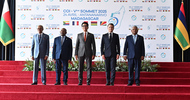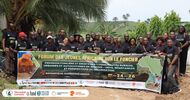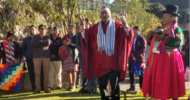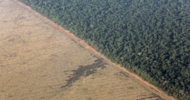A Chinese company developing farm land in the Ord River area has warned it will not proceed with the project under a raft of conditions set out by Australia's environmental watchdog.
- West Australian
-
22 April 2015
Despite the frequently-voiced opposition by many local indigenous Marind people. The new Indonesia government still looking to continue large-scale mechanised agriculture project, Merauke Integrated Food and Energy Estate.
Agriculture Minister Sangafowa Coulibaly says his government will make it easier to get land and speed up the process for investors wanting to get involved in arable farming.
The meeting brought together Economic and Trade Ministers from the UAE, Ghana, Morocco, Portugal, Spain and Macedonia to discuss how direct investment could be channeled into agribusiness to achieve food security and prosperity.
The CEO of Cayman Islands-based United Cacao is looking to expand his agricultural plantations by acquiring 450 units of private property in the Amazon and 97,000 hs from the Peruvian government.
Oil palm, billed as a way to improve local economic opportunity and reduce poverty in the tropics, may not live up to that billing, a recent report shows. On the front lines of oil palm expansion, the indigenous forest-dwelling Arfak people of West Papua Province, Indonesia believe they are not the beneficiaries of the palm’s promise.
George Soros is ready to invest $1 billion in agriculture and infrastructure projects in Ukraine if Western countries help private investment there.
Kuban Agricultural Holding is in talks to sell a stake with a number of Asian funds and investment companies, including Chinese firm CIC, which is interested in Basic Element's livestock division.
Mitchell's Yougawalla Pastoral Company the latest Australian cattle station business to be put up for sale. Foreign corporations have spent some A$63.5 million buying into the sector in the past month.
Palm oil conglomerate criticised for multiple violations of RSPO requirements that lands can only be acquired from indigenous peoples and local communities with their free, prior and informed consent.
Africa is seeing a new wave of colonialism as multinational corporations, aided by rich governments and financial institutions, vie to increase their control of land, seeds, water and other resources.
- Left Foot Forward
-
06 Mar 2015
Sale and leaseback agreements were almost unheard of in agriculture five years ago, but a few major deals recently have put them on the map, according to property group Colliers International.
The approach taken by Ethiopia and India to reaching development goals and fulfilling environmental promises by leasing or buying large tracts of fertile land affects land, water and indigenous people.
- Digital Journal
-
03 Mar 2015
People & Power investigates the environmental consequences of palm oil plantations in equatorial Africa.
- Al Jazeera
-
27 February 2015
he governor Abdul Rahman Al Khidir has meanwhile stressed when he received the UAE investors of Al Mohair Group, specialized in agricultural production in West Omdurman, that the state is ready to provide all necessary assistance so that the production reach its peak.
- Albashir
-
25 February 2015
La présence de sociétés étrangères dans l’agriculture ukrainienne croît rapidement, avec plus de 1,6 millions d’hectares d’exploitations agricoles passés récemment aux mains de sociétés étrangères.
Homes of chimpanzees destroyed by agribusiness companies – many foreign-owned – who are clearing vast tracts of rainforest throughout west and central Africa to make way for plantations producing palm oil, rubber and other commodities.
- Greenpeace
-
23 February 2015
Somalia’s farmland similar to its neighbouring countries is in danger of falling into the hands of transnational companies often in partnership with governments sometimes supported by the local elites.
The story of the defaulted company Mriya Agro Holding shows what risks investors and creditors are willing to take in the pursuit of profit in Ukraine’s agribusiness.
- Bankwatch
-
18 February 2015
Investors and hedge funders paying next to nothing for vast tracts of land in some African countries is a worrying trend and puts into context the Zimbabwe land policy and reform.
An inter-ministerial fact-finding committee from Yaounde has inspected the palm nurseries and other investment sites of the Sithe Global Sustainable Oils Cameroon Limited (SC-SOC) located in the South West Region of Cameroon.
- Cameroon Online
-
13 February 2015
The land market in Romania is left to chance, any occasional businessman being free to trade arable or forest land as long as they have a good lawyer or are up to paying a bribe to some civil servant.
- Nine O'Clock
-
12 February 2015
China's largest privately owned agribusiness company and the Perich family from Sydney are looking to buy a $100 million dairy in western New South Wales.
- Financial Review
-
12 February 2015
The Coalition has increased scrutiny of foreign purchases of rural land, but how much is currently owned overseas and are the concerns valid?
- Guardian
-
11 February 2015
Thousands of Polish family farmers from the Solidarity trade union protest new law that will allow land grabs by Western companies
- Landworkers Alliance
-
09 February 2015
Billionaire Englishman Stephen Diggle wants to put his wealth in land assets around the world and has bought New Zealand’s largest avocado orchard.
A new type of property deal is entering the agribusiness space as investor interest in the sector grows, according to property group Colliers International.
Changes and sudden loss of lands for indigenous people have far-reaching implications besides livelihood, income, and food. Despite pressure on indigenous communities, people are finding ways to defend their rights.
- Oxfam America
-
29 January 2015
Debate over large scale land investments in Africa is shifting from the disastrous impact of land grabs to the need for African governments to deal with citizens’ outrage by developing a ‘land policy’.
- Oakland Institue
-
28 January 2015
A new video from WALHI documents the views of villagers in Bengkulu Province, on the west coast of Sumatra, who are resisting the expansion of palm oil on their lands.
















